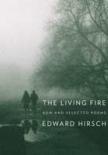Grace Abounding
It may not be too much to call Edward Hirsch a theological poet. It is not simply that in The Living Fire so many of his poems deal with issues like the problem of suffering or the “absence” of God, or with personages like St. Francis of Assisi or Simone Weil. Rather, in this selection from his seven previous volumes (1981-2008), something numinous seems to haunt his musings, an intuition, perhaps, of spiritual meaning in the daily news; and even more to the point, a quality of compassion that transcends sentiment in a conviction of mystery.
In an interview in 1988 with Artful Dodge magazine, Hirsch, noting a lack of tenderness in much American poetry, said, “It was that tenderness I wanted to establish in my own work.” In “Edward Hopper and the House by the Railroad” (1925), Hirsch imagines the bleak urban world so prominent in Hopper’s work, the deserted house standing for its former inhabitants with its “utterly naked look of someone/ Being stared at, someone American and gawky,/ Someone who is about to be left alone/ Again, and can no longer stand it.” The hesitation before “Again” in the last line is not only technically adroit but emotionally on target—the poet’s compassionate response to human loneliness and anomie.
A similar mixed-media strategy informs “Still Life: An Argument.” Here, the temporal “stop” effected by the artifice of painting alerts us to the dilemma of moral choosing that haunts even our most uneventful moments. Granting that “even lovers have still lives,” he warns, “we will always be about to destroy/ each other, always about to touch.”
Hirsch’s tough but compassionate questioning is notable in poems like “The Village Idiot,” “Elegy for the Jewish Villages” or “Simone Weil: The Year of Factory Work.” In “My First Theology Lesson” an old man laments the lost Jews of Poland: “Rumpled and furious,” he declares the withdrawal of God from “our deranged and barbaric century,” leaving us “to contemplate the ghostly absence,/ ourselves alone in a divine wilderness.” This paradoxical affirmation of God manifest in absence calls to mind Abraham Heschel’s “Even the darkness is God’s darkness.” Indeed, it is in this mystery of darkness that Hirsch finds hope. In his countercultural “Song Against Natural Selection,” he states his premise: “The weak survive!” and implies that the very violence and suffering that incite the rage of the atheist are the indispensable stuff of our transcendence: “we survive/ so that losing itself becomes a kind/ of song…this/ is how we recognize ourselves, and why.” Current cosmological theologians, who see in the chaos of evolution a template for the drama of salvation, should find in this poem a measure of affirmation.
Ironically, a poem entitled “Away from Dogma” I found to be Hirsch’s most profoundly theological. Based upon the writings of 20th-century mystic Simone Weil, this three-part poem begins with her declaration: “I was prevented by a sort of shame from going into churches. Nevertheless, I had three contacts with Catholicism that really counted.” “In Portugal,” her first contact, expresses the ambiguity of one overwhelmed by a sense of the divine but unable to embrace a particular religious response to it. Watching the peril-accustomed fisher wives processing with candles at eventide and “singing/ hymns of heartrending sadness”, she identifies with them in this tenebrous ambience that echoes their lives, even as she “will not kneel/ before Him.” “Still,” Hirsch notes, “the faith of the fishermen’s wives/ lifted her towards them…” Here Hirsch discovers the grounding of her faith—not in dogma or dialectic, but in the sacrament of compassion—the same compassion, perhaps, that marks his own poetry. What is most important is that her (and his?) questing, more ontological than discursive, reveals the role of love in the mysterious venture of belief.
Weil’s second contact, “In Assisi,” shows her still hostile to “miracles in the Gospels and to popular tales of apparitions,” but so moved by St. Francis’ compassion for all creation that “something she neither believed/ nor disbelieved…forced her to her knees.” Her third contact, “At Solesmes,” takes place during Holy Week and describes her own Christ-like suffering as she embraces the labor and hardship of the poor—a choice some believe led to her physical decline and early death. A strange assurance accompanies her distress: “She felt an invisible hand wavering/ over the rags she was leaving behind.” “Away from Dogma” concludes: “between the word forsaken and the word joy/ God came down and possessed her.”
Edward Hirsch is, in many senses, a graceful poet. His technique is certain and hidden, his style so generally colloquial that his judicious lyric eruptions have enormous effect and resonance. In some later ventures into repetitive forms suggesting the villanelle or sestina, I sensed a certain self-consciousness of craft—a dancer watching his feet through a new step. Though many poems in this collection are not explicitly theological, grace abounds throughout. Against the postmodern darkness, Hirsch offers a counterpoise of compassion, a sense of intimacy with suffering and a breadth of wonder embracing art and learning, the ordinary and the cosmic. And he does so in the great adventure of faith, the dark wrestle with God. As with the mystic Simone Weil, whom he so clearly admires, he will not settle for a God of easy assurances.
This article also appeared in print, under the headline “Grace Abounding,” in the May 24, 2010, issue.








